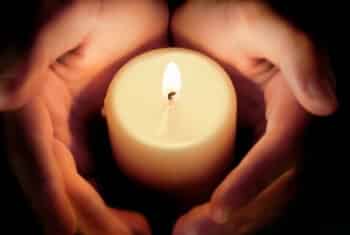In 1974 a tornado touched down within a couple of miles of my house. My husband and I watched it wreak havoc from our back door one April evening. It happened about six p.m. As dark fell, there were no lights anywhere. Electricity for our part of the county came through the area hit by the storm. There would be no lights through the night. We didn’t have a battery powered radio (or cell phones in those days!), so every hour or so we went out to the truck to turn on the radio to find out what was happening. We learned storms were expected to continue through the night. Some of them might generate additional tornadoes. There was nothing to do but wait through the dark.
We lived on top of a hill on our small farm. My parents lived about a quarter of a mile away (about a half-meter) on top of another hill to the west. My grandmother lived a similar distance on top of a third hill to the north. We had checked on each other after the tornado passed. We knew we were all OK. We all had basements for shelter. But phone lines were down, too, so communication meant crossing fields. We each chose to stay in our own home through that long night.
My mother put a candle in her kitchen window. My grandmother put one in her living room window. We had one in our kitchen window. From the tops of the three hills we could see each others light shining. In the great darkness of no electricity anywhere, those single candles burning created a light for all of us. More than forty years later I still remember those candles when I hear today’s Gospel reading.
Jesus tells us today to be the “light of the world.” “A city set on a mountain cannot be hidden. Nor do they light a lamp and then put it under a bushel basket; it is set on a lampstand where it gives light to all in the house.”
I have trouble seeing myself as a “city set on a mountain.” Some days I’m not much of a lamp. But I can always be a candle. I can always let my little light shine.
Sometimes the light of a candle isn’t noticed unless there is lots of darkness. When dark surrounds us, a single candle can give light, hope, comfort.
Whose candle of faith is light for you? Who lighted your way when you were in stormy, dark times?
What is it you do that is a candle of faith for others? A smile for those whose names you don’t know that you meet day after day on the way to work? The visit you make to the Blessed Sacrament whenever you pass by church? The witness of caregiving you give a parent, child, spouse, or neighbor? The way you say your rosary while you walk the dog? The gentle way you answer a co-worker whose comments set others’ teeth on edge? The way to pray in front of an abortion clinic? The joy with which you participate in mass? The joy you take in your children?
You never know when your little light is a candle in a storm for someone.
In today’s first reading, from 2 Corinthians, St. Paul talks about the candle witness of having your actions match what you say and the candle witness of not jumping to conclusions about someone’s intentions.
It helps to understand the context of the reading. After the section read yesterday, Paul talks about a promised visit to Corinth which he was not able to make. He assures the Corinthians that he hadn’t just said he would come—he intended it. It was not possible to do. Then, as Paul so often does, he teaches Christian doctrine as he talks about a practical problem: the word of a Christian stands on the great “yes” of God. God’s fidelity and love is seen in Christ’s willingness to express and live “the promises of God.” That same fidelity and love is possible (required?) of a Christian, because the Holy Spirit lives in him. The Corinthians can believe Paul because Paul’s light of witness is the same light of goodness in Christ.
Again, it helps to understand the context. Corinth was an unholy city. Integrity of keeping one’s word was not part of the culture. Paul knew that (read 1 Corinthians). He says in effect, “that may be your culture, but it is not God’s way. God’s way is to be light for the world; it is to mean what you say. A Christian does not say one thing to please others with no intention to do what is said. A Christian intends to be trustworthy.”
As Catholics we see intention as very important. Humanism today says, “It is the results of what you do that is important.” Our Catholic faith says, “No, God reads hearts. Intention makes a difference.” Intention is not the only criteria for right or wrong, (evil in the action and in the effects are also important), but, as Christians, we give each other some grace from time to time when someone doesn’t follow through. We see the integrity of intention and of the person.
We see the candle—and maybe find a way to move the bushel basket that blocks its light. We give each other some grace. We look for and find the goodness–even when things do not turn out quite right.

